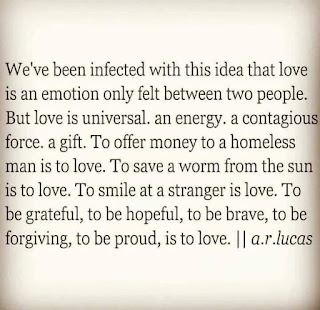Broken, we can never be whole. The cracks can
show. Especially under duress. “Just who do you think you are?” can resonate
down the decades. We can poison ourselves with our past. We can so easily be
hamstrung, hobbled, hurt.
Overcoming childhood insufficiency can be the
worst of it. Little girls are demeaned by boys, by parents, by others. Little
boys too. Like atavistic swimmers, all hoping to reach the edge ‘first,’ there
is little of compassion for (let alone consciousness of) others. It becomes a
learned thing; we are taught not to step on ants. Gratitude to those who teach
‘love,’ gets profound.
It is thinking about our thinking that
enlightens us. Victim, or victorious, that which was the past can debilitate, or temper our metal. And
although we each are influenced by all those around us, ‘good,’ or ‘bad,’ (according
to The Good Book, to steal from Tevye’s performance in ‘Fiddler on the Roof’), in
the sum of it all, what one makes of one’s life, along the way, is actually up
to oneself. Indeed, one needs think about one’s thinking.
That’s the rub. We are so easily given to
blaming others, or even relying on an ‘Other,’ that such qualities of
‘Self-Reliance,’ and ‘Self-Actualization,’ (let alone ‘Independence,’) are
relinquished into the purvey of our acculturation. Thus it is that there can be
a perpetual ringing of bell-curves in one’s sensibilities. At each juncture of
one’s paradigm shifts (or not,) there is the sense of being an outlier, leaving
an old perspective, until absorbed by the ‘kismet’ of others into yet more and
more acceptance of what once appeared surreal.
In, ‘ADMISSION, a Story Born of Africa,’ Adam
Bradford encounters extraordinary challenges. Given the physical and emotional
abuse perpetuated by a family who do not understand his gifted nature; given
the page-turning adventures among lethal snakes; a child-snatching crocodile;
attacking baboons; a marauding leopard; his having to shoot his beloved pet
donkey; and given the racially charged threats, subsequent murders, and the
political capitulation of Northern Rhodesia into Zambia (1974); for Adam there
is an ‘otherworldly’ quality to his life that (unless in some measure personally
experienced by others,) can indeed appear surreal.
His reader, one trusts, can relate to the
secrets he is forced to keep. His reader, one trusts, can relate to the
necessity to surmount physical pain, emotional difficulty, and inordinate
challenge.
But in relating his unusual story, Adam realizes
that the sheer gauntlet of challenges can hardly be de-rigueur, for most. Thank
goodness. It is his teenage years that become all the more remarkable. His illicit
and interracial affair could prove lethal. His countenancing an abusive uncle
results in extreme hardships. His gainsaying the church gets him whipped. His
escape to a boarding school results in yet more secrets to keep, and when
graduated, and a conscript in the South African Army, he needs take control of
his future, let alone be a victim of the past.
We turn the page to a New Year. We celebrate the
old, learn from the past, and venture into a relative unknown. Some of us are
comparatively secure. We have loved ones near enough. We do not necessarily
feel geographically displaced. We have positions in society, welfare sufficient
to our means, and friends and family, and are relatively fortunate. (Yes,
despite it all, there are those in dire distress, near and dear.) Yet we are
not necessarily victims of our past, unless ‘pushed’. Oh, certain things can ‘set
us off.’ Most usually, they are the things that result from our perceptions
during our upbringing. And thinking about our thinking, indeed, can prove not
only a necessary thing, an immediate thing, but an enduring thing. Accordingly,
adjustments are, consciously, made. After all, each year may indeed be ‘new,’
but so is each moment.
Or do we declare ourselves, ‘always,’ poisoned
by our past?

